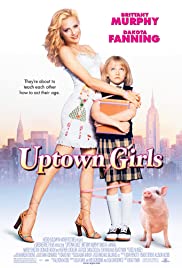
UPTOWN GIRLS
US, 2003, 92 minutes, Colour.
Brittany Murphy, Dakota Fanning, Marley Shelton, Donald Faison, Jesse Spencer, Austin Pendleton, Heather Locklear.
Directed by Boaz Yakin.
This is not a film for adults to be reviewing. Most might find it hard and irritating going.
Brittany Murphy (Clueless, 8 Mile, Don't Say a Word) is an irritating young woman, unlucky in love and just about
everything else despite have a famous rock and roll father who wrote a song for which everybody knows. She can be ditzy most of the time because money is not what she lacks. Responsibility has never been part of her vocabulary or her life. She can't resist spending despite the caution of her endlessly patient friend. Abandoned by the English musician she thought was the one, bankrupt and impossible to live with, she accepts a job as a nanny for the daughter of a club owner (Heather Locklear).
Dakota Fanning (I am Sam, The Cat in the Hat) is an irritating young girl. Left to her own devices by her absent mother, she is rigid in routines, demanding and intolerant.
If you need to see a film where two people change as you know they are going to, from impossible to nice, then this is your film. Despite the talents of the two actresses, this seems a long story.
1. The audience for this film? Teenage, children, adults? Identifying with particular characters, issues?
2. The title, the reference to the city, New York as the city? The variety of locations, for Molly, for Ray? The buildings, the apartments, the locations? The musical score and songs, especially for Neal and his singing?
3. The tone of the film, comedy, serious? The slapstick, the parody, the satiric and ironic tone? The realism, the portrait of the adult and the girl, their interactions, their family backgrounds, the film's comment on family, on the need for relationships and love?
4. Molly, her wealthy father, his singing, his writing songs about her? The shrine to him? His absence? The effect on Molly, being spoilt? Her friendship with Ingrid? Boyfriends? Having no idea of money? People coming in and out of her apartment? The sudden discovery that her manager had stolen her money?
5. Her denial, going to the shops and trying to buy things, her friends trying to help her face reality? Her relationship with Neal, the meeting, friendship, shared interests, music, the sexual relationship? His moving on? Her being stranded?
6. Answering the advertisement, the interview with Mrs Schleine? The criticisms of Mr McConkey? and his ousting her? Her taking the job, her inadequacy? The initial relationship with Ray? The contrast between the two? Her trying to manage, making a mess of things, Ray reprimanding and correcting her? Going to the club, seeing her mother, her mother's neglect of Ray? Their having to be together? Each trying to outwit the other? The gradual breaking down of the barriers, Ray mellowing, Molly having to take some responsibility? Molly's paralleling Ray's life with her own? Their going out, beginning to share things together, talk? The breaking down of the barriers, Molly being fired, Ray's reaction, Molly and the bond between the two? A future?
7. Ray, her age, her being controlling, concerned about health? Alone in the house, the wealth, her unhappiness, her mechanisms for surviving? Her relationship with her mother, her mother's absence? Cantankerous, making life difficult for nannies? The initial antagonism to Molly, trying to thwart her? Molly and her sense of failure, coming back, the gradual breakdown, Ray discovering that she could not control everything, her need for affection, her need for love? Shared experiences with Molly, the change? Her ballet, wanting her mother to see her performance, Molly as the surrogate mother, her skills and talent despite antagonising people during rehearsals? Her change?
8. Neal, his music, meeting with Molly, in awe of her father, the relationship, staying in the apartment? His eventually leaving, his return, his being transformed by his success?
9. Ingrid, Molly's best friend, trying to help her, exasperated at Molly's behaviour, trying to make her face the truth? Her continued support? The other friends, their crashing in the apartment, their disappearing when Molly fell on hard times?
10. The predictability of the film, the two antagonistic characters, their abrasiveness, irritating each other - and the audience? Audiences knowing that each would break down and would come to depend on the other and learn how to love?